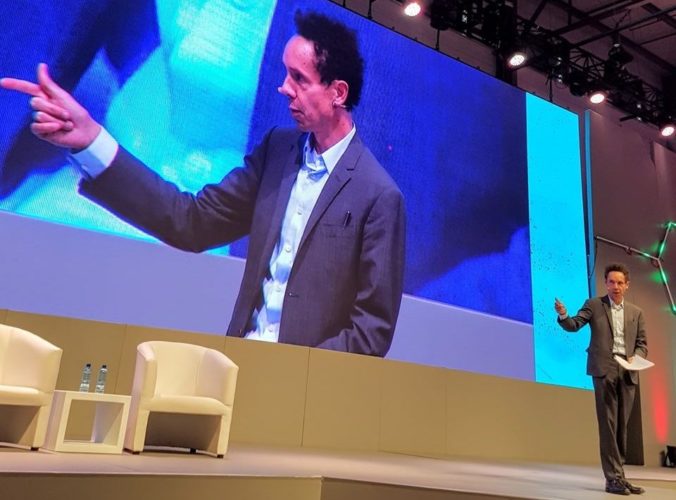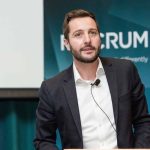
Reaching my tipping point in the blink of an eye with other outliers
Nearly 20 years ago, one of my best mates Christo Crafford and I won a quiz at the Gordon Institute of Business Science, when we were the first team to correctly give the name of the author of a book which was causing a sensation at the time – Malcolm Gladwell, author of The Tipping Point.
I always felt I owed Malcolm for the two business class flights, office chair and cash I won – as much of the rest of my answers that helped get us to the final were guesses (it was only a few years ago that I showed any interest in and understanding of share valuations, economic principles and strategy gurus) – but the answer to THAT question both Christo and I knew, and we pressed our buzzer in record time.
Authors are my heroes. And ones like Gladwell who write magnificently for The New Yorker, even more so. In the words of Gus Silber (another magnificent writer): “Gladwell is a polymath, promiscuously interested in anything and everything, and his talks segue effortlessly from stories of little-heralded entrepreneurs to the world of high finance to leadership to sport to decisive battles of the American Civil War. [Gladwell] is the Jimi Hendrix of the Illuminating Anecdote, riffling on data, drenching dry texts with electric feedback, pumping up the volume on little-heard theories that deserve wider play.”
When I saw that Gladwell would be in South Africa presenting a masterclass at the BCX Disrupt Summit, I knew I had to attend. Luckily, the crowd at Purple Group are innovators deluxe and were supportive of me going. In short, I was blown away. Whilst expecting to be impressed, I was not expecting Gladwell to present three session of (mainly new) material, take questions, graciously sign books and be so engaging. And whilst the best way to experience Gladwell is through his books (maybe now that South Africans have read Jacques Pauw’s book they have rediscovered how powerful reading can be!) what follows are a few of my key take-outs:
In his first talk, Gladwell elaborated on a few of the traits that entrepreneurs/innovators/disruptors (labels that were used rather interchangeably) have:
- They are disagreeable. This word has negative connotations – and sometimes entrepreneurs can be “nasty” – but Gladwell’s definition of “disagreeable” is that one doesn’t need the approval of others to do what is right. I think there is also an element of courage in here. And perhaps what causes some loneliness in an entrepreneur.
- They are creative and can reframe a problem – not merely tweak it. Reframing is hard to do as one has to step out of conscious and unconscious bias to see how the world could be.
- They are in a hurry! They have a strong sense of urgency and the discipline to follow through.
Gladwell’s examples of how Ikea started (bet you knew Sweden featured, but suspect you didn’t know Poland’s role – and at the time it would be like Microsoft opening a store in North Korea today!); how radio became huge (a boxing match was the first live sports broadcast) and the way shipping/supply chain logistics changed (made me think a lot of one of CN&CO’s new partners RTT – a very special logistics company – watch this space…) were all, quite simply, riveting.
In the second session, Gladwell speculated about what an organisation should be like in this new world of ours. His stories centred around two acts of generosity by American men – giving over $100 million to tertiary institutions – one largely unknown and the other Harvard. Using these two stories, Gladwell spoke about weak link and strong link organisations. Again, I take from Gus Silber who says it so much better than I could:
“ ….Weak Links vs. Strong Links, as first postulated by the British economists, Chris Anderson and David Sally.
“Would you be better off in football, asked Gladwell, if you improved your best player, or your worst player? The answer, of course, is counter-intuitive. You focus on the weakest link.
“Football is a game of intense interaction, and if one player fumbles a pass, the game could easily be squandered, no matter how good your star players may be. Basketball, on the other hand, is a game of ‘strong links’ – as long as you have three to four ‘truly amazing’ players, you can get by, as Gladwell puts it, with ‘one slow, lumbering white guy from Australia’ in your squad.
“Applied to the world of business, this means that you need to build and spread skills across your team, rather than rely on the leadership acumen of your brilliant, charismatic founder. It’s at the weakest link that your company could fall apart.
“Then Gladwell turned the theory to education, using the example of a school in Paris, that has done away with teachers, in favour of a model of collaborative learning. The day’s problems and exercises are posted on screens, and the students work together to solve them. The strongest students help the weakest students; the weakest become stronger in the process.
“This sounds to me like a dream, a vision of democracy at its most Utopian. People don’t need leaders – maybe they don’t even need teachers – as much as they need each other.”
A great challenge for organisations (and I am especially thinking of CN&CO and our many partners here) to decide which you want to be – and what is required for that to work. It is in how we shape our teams that we will be able to respond to the challenges life throws at us. Intuitively I prefer weak link organisations, but do I always act in that manner? Great food for thought (and action of course!)
My biggest take-out in this talk was around St Stithians. St Stithians is excellent not because of our academics, sport or cultural achievements. Those are expected and standard for a school that has the benefits we do. What makes St Stithians, to my mind, extraordinary is that from our founding and through the years, we have always been about more than this strong link excellence. Our educational philanthropy has seen the establishment of Penryn College, the sheer magnificence of Thandulwazi (an organisation that is, to my mind, the single most impressive aspect of our values) and so much more.
We are a weak link organisation – knowing that to succeed, to thrive, we need all members of our community to be strong. No wonder we are making such good progress in terms of race, gender and other diversity (including diversity of temperament – a vital aspect in organisational health according to Gladwell).
Saints has a way to go but Gladwell’s talk confirmed for me that we are on the right track. It also made me proud that my investment arm, Elcar Invest, is soon to be 49% owned by Thandulwazi. Viva #SaintsExcellence and thank you to all who contribute and serve.
The final session was one in which Gladwell spoke about leaders and leadership. He challenged the notion of “experts” and told a fascinating tale of a American Civil War battle. In short, over-confidence in leaders (too much knowledge) terrifies Gladwell, while incompetence (lack of knowledge) is a mere irritation.
I was seriously challenged by thinking of people who, in my own circle, are over-confident – as Gladwell is right, of course. The consequences can be terrifying.
In Gladwell’s words: “In times of crisis, we don’t need leaders’ expertise, but rather their humility.”
I was particularly struck by Gladwell’s proof that “expert” leaders who get more info don’t actually know more, but simply “think” they know more – leading to blind spots. Wise words to ponder on!
Other Gladwell gems include:
- His “suspicion” of bigness
- His view that SA must not be too hard on ourselves: Just because you have, in under 30 years of democracy, achieved less than you had hoped for, do not negate what you have achieved. And don’t forget that 150 years AFTER the America Civil War, the USA still struggles with issues SA does. So (in Carel words) CALM DOWN, GET PERSPECTIVE
- Bias is caused by lack of experiences – and (again in Carel words!) – diversity rules! Seek out people who challenge you and visit places that scare you
- Fake news existed when the printing press was invented. Chill
- He forbids people to tell him about their education when he interviews them for jobs. A validation for me of never reading CVs before an interview 🙂
In conclusion – Gladwell demonstrated throughout his “performance” the art of storytelling. The man is bright, no doubt. The man is a deep thinker, no doubt. But the magic comes in his ability to tell a story. Don’t neglect telling your story, my friends. And be sure to listen to other stories. I wrote this blog (and my team mates CN&CO write theirs) because life is diverse, rich, exciting and challenging – and it is through writing, reading and communicating that we can pay forward what we learn and grow as humans. So send me your blogs, read, write and continue making our world just that little better!
P.S. I also nicked the photo for this blog from Gus’s Facebook page. I owe you one, Gus. (Actually, probably more than one.)






